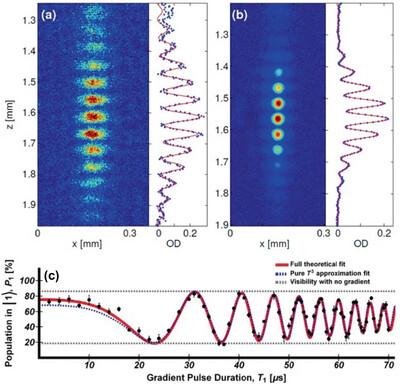Commentary on “A simple, practical experiment to investigate atomic wavefunction reduction within a Stern‐Gerlach magnet” by Michael Devereux, published in J. Phys. B: At. Mol. Opt. Phys. 57, 152501 (2024), https://doi.org/10.1088/1361‐6455/ad5992
引用次数: 0
Abstract
Experimental proof of coherent spatial interference from the logitudinal (1D) Stern-Gerlach (SG) interferometer. (a) A single-shot interference pattern of a thermal cloud with a negligible BEC fraction, with a visibility of 𝑉 = 0.65, clearly showing that a BEC is not needed for the interferometer to work. (b) A multishot image made by averaging 40 consecutive interference images using a BEC (no correction or postselection) with a normalized visibility of 𝑉 = 0.99, proving that the interferometer is phase stable and that no BEC interference (with random fringe position) was involved. (c) Spin oscillations observed at the output of the full-loop SG. The data agrees almost perfectly with the theory developed for a spatial interferometer by the group of Wolfgang Schleich. The excellent agreement again proves that coherent spatial splitting has been achieved. Additional experimental results include clock interferometry and geometrical phase, results which all fit nicely with the theory of a spatial SG interferometer. For a detailed review of the experiments see: Keil, M. et al. (2021). Stern-Gerlach Interferometry with the Atom Chip. In: Friedrich, B., Schmidt-Böcking, H. (eds) Molecular Beams in Physics and Chemistry. Springer, Cham. https://doi.org/10.1007/978-3-030-63963-1_14

对 Michael Devereux 在《J. Phys. B: At.Mol.Opt.57, 152501 (2024), https://doi.org/10.1088/1361-6455/ad5992
对数(1D)斯特恩-格拉赫(SG)干涉仪相干空间干涉的实验证明。(a) 热云的单光干涉图,其 BEC 分数可忽略不计,能见度为 𝑉 = 0.65,清楚地表明干涉仪的工作不需要 BEC。(b) 通过使用 BEC(无校正或后选)对 40 幅连续干涉图像进行平均而得到的多点图像,其归一化能见度为 𝑉 = 0.99,证明干涉仪相位稳定,不涉及 BEC 干涉(随机条纹位置)。(c) 在全环 SG 输出端观察到的自旋振荡。这些数据与沃尔夫冈-施莱希小组为空间干涉仪开发的理论几乎完全吻合。出色的吻合再次证明了相干空间分裂已经实现。其他实验结果包括时钟干涉测量和几何相位,这些结果都非常符合空间 SG 干涉仪的理论。有关实验的详细回顾,请参阅 Keil, M. et al:Keil, M. et al. (2021)。使用原子芯片的斯特恩-格拉赫干涉仪。In:Friedrich, B., Schmidt-Böcking, H. (eds) Molecular Beams in Physics and Chemistry. Springer, Cham.https://doi.org/10.1007/978-3-030-63963-1_14
本文章由计算机程序翻译,如有差异,请以英文原文为准。
求助全文
约1分钟内获得全文
求助全文

 求助内容:
求助内容: 应助结果提醒方式:
应助结果提醒方式:


